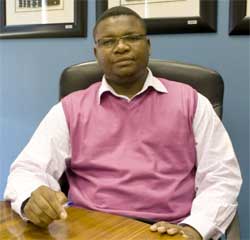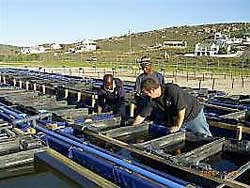The Eastern Cape Development Corporation (ECDC) has provided funding of R2,5m for two pilot projects for testing the development of furniture from polyfibre.

ECDC's Phakimisa George says the combination of fish farming, furniture manufacture and production of school shoes are some of the projects that the ECDC is currently funding. Image:
GetNewsThe project has aroused some interest from the Department of Trade and Industry (DTI), which has set aside R54m from its employment creation fund for the project if it is successfully commercialised. Polyfibre comes from a mixture of plastic and plant material and is being used to harden furniture to stop it from deteriorating or cracking.
The polyfibre project came about after the Department of Economic Development, Environmental Affairs and Tourism (DEDEAT) asked it to fund a project to establish buy-back centres at solid waste disposal sites as a means to create jobs in the province where unemployment is rife.
"The first buy-back centre was established in Stutterheim followed by Grahamstown and Port Alfred.People working at the buy-back centres collect plastic, which is then packaged and sold to ECDC partner Iwars.
A woman's co-operative in Port Alfred has been set up to collect waste from pineapple leaves from farmers and strip it into thin fibres which is then sold to the ECDE's partner, IWARS. The fibres are mixed with plastic to create a material to manufacture furniture.
From pilot to commercialisation
"In the first pilot, R1m was spent in the design and preparation of the pilot site and setting up two buy-back centres. A total of R1,5m was then spent on the second phase of creating a pilot site," says ECDC Risk Capital Specialist Phakamisa George.

A pilot fish-farming project that will produce more than 10,000 tons of catfish a year in Graaff-Reinet is well underway and should be fully commercialised soon. Image:
DlistThe pilot project is in its final stages of commercialisation and is awaiting certification from the South African Bureau of Standards (SABS).
George says machines at a small plant in Port Alfred have been set up to make window and door frames and outdoor furniture. The Department of Human Settlements says it is interested in buying these produces for its RDP houses once they have been certified by the SABS.
"This is just one of many high-value projects ECDC is pursuing for sustained economic growth and employment creation in the province.
Karoo Catch fish farming
The ECDC committed R10m in risk capital in 2013/14 and R8,7m on the scoping and implementation of projects. It facilitated a R104m funding allocation for other development projects in the province," says George.
Furthermore, the ECDC is implementing its R25m Karoo Catch aquaculture project in Graaff-Reinet, working with Blue Karoo Trust where two fishing ponds have been established along with a nursery and training academy for aquaculture training of unemployed young people.
"By the end of the financial year the project had an agreement to produce 10,000 tons of catfish a year. Another R10m in funding was provided by the DTI to build 13 more ponds and, when these are complete, Karoo Catch will produce 13,728 tons of catfish a years," George says
He says this project will create 300 direct jobs and is now trying to arrange the necessary funding to set up its own fish-processing factory. Blue Karoo Trust will own the factory if the additional funding of R56,9m is received from the ECDC and the Industrial Development Corporation (IDC).
In addition, the ECDC is involved in establishing a production facility for Khuphukani Leather, a Mthatha-based shoe-making operation run by disabled owners.
The project, which employs 21 people, makes school shoes and has purchase agreements with schools in the King Sabatha Dalindyebo Municipality. It makes about 200 pairs of shoes a day.
"The strategic intent for ECDC's risk capital facility is to increase investment in initiatives that unlock the economic potential of low income areas through innovation, local beneficiation and new product development. The ECDC invests in a portfolio of projects at a conceptual stage and its risks remain high," George said.
"However, ECDC takes on projects with a medium- to long-term view of converting its funding into equity once the project reaches commercialisation," says George.





































